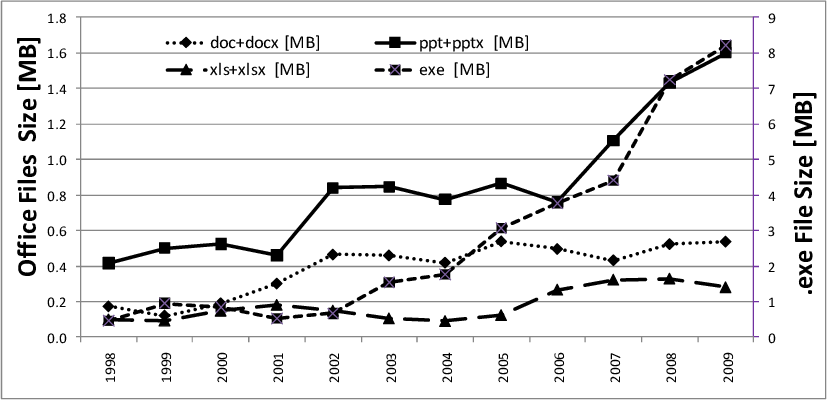How Software Engineers Nullify the Advantages of Faster Internet When Surfing The Web
Recently, I was trying to access a website and it was taking quite some time, so long in fact that I had to ask myself if there was any evidence that my internet is faster than what I used as a kid. Sure, you're going to say we have a bigger number in front of the "G" but does this mean 5G is any faster than 2G was back in the good old days? 😏
Yes, I agree that network speed is light years ahead of what we had some 20 years ago. However, if we look at this issue from a perspective of the marginal increase in utility, you'll realize that our growth hasn't exactly translated to development. We can download faster than we could 20 years ago, but the size of the average file has grown maybe 200-fold in the last 20 years.
I decided to take things up a notch and do some actual academic research and it turns out that the average file size has gone up over the years, as evidenced by the research of Haddon, Leslie & Heinzmann, Peter. (2011). Implications of the variation in broadband speeds over time. The graph below depicts the growth in file sizes of different documents over time.

A Growing Concern
It's become so noticeable that questions are being asked on Quora regarding the growth of file sizes relative to internet speeds. Now if you're thinking "So what? things are the way they are, at least we sometimes enjoy the perks of faster internet" I'm going to explain how these things affect business.
Some research I did revealed that the average load time for a landing page on a mobile device is 15.3 seconds. We both know that waiting for a website to load is annoying, and I'm not the only person that feels this way.
A survey brought to light the fact that 79% of people shopping online claim they won't return to a slow website. To make it more apparent, there's a 29% difference between the bounce rate of a website that takes 2 seconds to load and a website that takes 5 seconds to load.

Identifying the Culprits
Now here's the fun part; assigning blame 😂. The development team of the average website is fully culpable for the menace we have in society today. The UI/UX developer who creates flamboyant designs in a bid to appeal to the visual senses of users, the frontend developer also shares in the blame for not optimizing the size of the resources being used on the webpages.
The backend developer sometimes writes code that contributes to the lag on the platform, a lot of framework saves the developer time used in writing some code but transfers the burden to users in the form of slower load times on websites is also responsible for our trials and tribulations on the web 🤧.

Possible Solutions
I'll be hardpressed to believe there's a tangible reason why a video should be on the landing page of a website. Some animations are also quite unnecessary if they need to use bulky files and can't be created using code that doesn't stress the machine.
The format of images used on many websites need to be reviewed, SVGs are more scalable and lighter than other image formats, yet a lot of websites don't use SVGs yet.
Embedding videos on websites (through platforms like YouTube) is a much better way to utilize videos on websites. The size of images should be kept as small as possible without compromising the quality of the images.
Finally...
Users need to understand that software development is about making tradeoffs, what is pretty isn't always efficient and we (as netizens) need to collectively understand that we don't exactly need a website with all the design bells and whistles as much as we need a faster website. Product managers are also important in striking a balance between what is needed and what is wanted in the process of developing websites.

